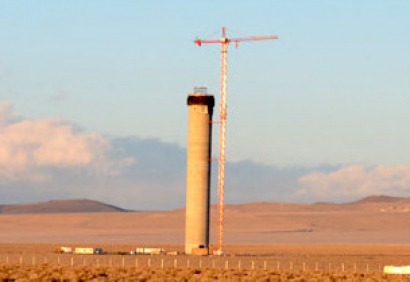
"We are proud to be a leading example in Senator Reid's Nevada Clean Energy Report that demonstrates how public-private partnerships create jobs and economic growth for the local community and state," said Kevin Smith, CEO of SolarReserve. "Clearly, SolarReserve's Crescent Dunes Solar Energy Project that is currently under construction near Tonopah, Nevada, could not have gone forward without supportive public policies and the leadership of Senator Reid and other members of congress and the administration."
As the report states, the 110 megawatt Crescent Dunes solar thermal energy project near Tonopah will be capable of generating electricity to power more than 43,000 homes (75,000 homes during peak project operations). One hundred percent of the electricity generated by the project will be sold to NV Energy under a 25-year contract, providing Nevada's largest utility with clean, reliable energy at stable prices that will be unaffected by volatility in oil, natural gas or coal prices. In addition, SolarReserve's innovative US-developed energy storage technology can store the sun's energy for an entire day to generate electricity when needed, without interruption after the sun goes down or during cloudy periods – even 24 hours a day.
Critical to the need to diversify Nevada's economy, the project will directly employ more than 600 workers on site during peak construction activities, nearly all being Nevada residents. Construction of the facility began in September of 2011, with the solar power tower portion of the project completed in December 2011. To date, there have been more than 100 workers on site so far with local Nevadans comprising 81 percent of the construction workforce. Commercial operation is scheduled for the end of 2013.
Nevada-based companies have made up 80 percent of the on-site contractors thus far, including union and non-union firms. When accounting for offsite services and supply, more than 4,300 direct, indirect and induced jobs will be created at companies throughout the U.S. that provide engineering, equipment supply and manufacturing, transportation and other value-added services. To date, orders for the project have been placed for equipment and services in more than 20 states across the US.
As Senator Reid's report points out, SolarReserve's project has helped Nevada rank third nationally for utility-scale solar projects under development. The Crescent Dunes Solar Energy Project is now the world's most advanced solar thermal energy technology. In addition to the ability to store the sun's energy for use during peak electricity demand periods, the project will generate almost two times the electricity in kilowatt-hours than that generated by a similarly sized photovoltaic (PV) or competing direct-to-steam solar thermal energy technologies.
With an investment of nearly $1 billion, this project could not have been built without federal policy programs to support renewable energy advancement and implementation. The project completed full financing in September of 2011, utilizing the Department of Energy's Loan Guarantee program along with more than $250 million in private equity investment from SolarReserve, ACS Cobra, a worldwide leader in the engineering and construction of power plants and thermal solar facilities, and Santander, a global financial services and banking leader. Nevada's Renewable Portfolio Standard, requiring that the state generate 25 percent of its power from renewable sources by 2025, has been critical in attracting companies like SolarReserve to the state.
Once operational, the project will expend more than $10 million per year in salaries and operating costs, and is forecasted to generate $47 million in tax revenues through the first 10 years of operation - contributing to workers' paychecks, service businesses, local school systems and police and fire departments.
"We recognize that not everyone in Washington supports the advancement of clean energy," said Smith.
"Given the limitations of fossil fuel generated electricity – both with respect to supply and impact on the environment – it is vital that policies to support renewable energy continue. These policies are important for building additional projects, continued job growth, reducing pollution, competing in the global marketplace and realizing energy security for the United States."
For additional information:

